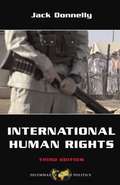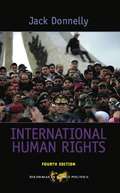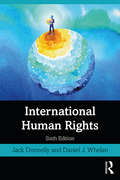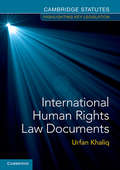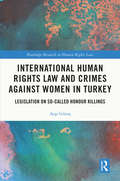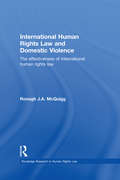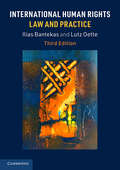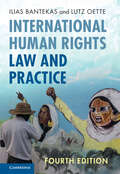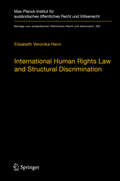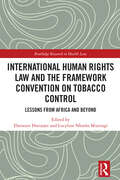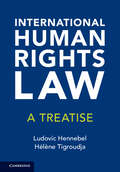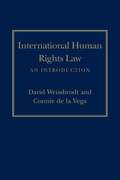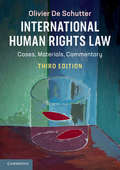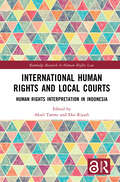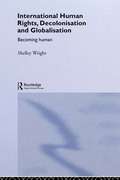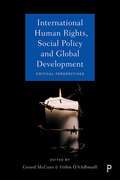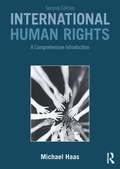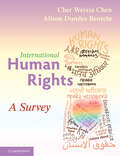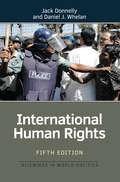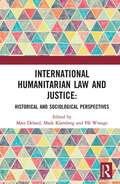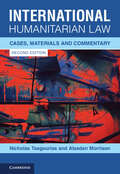- Table View
- List View
International Human Rights
by Jack DonnellyInternational Human Rights studies the ways in which states and other international actors have addressed human rights since the end of World War II. This unique textbook features substantial attention to the domestic politics of human rights, as well as an extensive emphasis on theory. The fourth edition is substantially rewritten and reorganized to enhance usability, with new material is added to bring the text up to date. The sections covering multilateral, bilateral, and transnational action have been broken into seven short chapters, and new case studies provide context and points of comparison. Additionally, nine "problems" have been added to the text, which along with the chapter-ending discussion questions, frame alternative interpretations, highlight controversies, and ultimately aim to provoke further thought and discussion.
International Human Rights
by Jack DonnellyInternational Human Rights studies the ways in which states and other international actors have addressed human rights since the end of World War II. This unique textbook features substantial attention to the domestic politics of human rights, as well as an extensive emphasis on theory. The fourth edition is substantially rewritten and reorganized to enhance usability, with new material is added to bring the text up to date. The sections covering multilateral, bilateral, and transnational action have been broken into seven short chapters, and new case studies provide context and points of comparison. Additionally, nine "problems" have been added to the text, which along with the chapter-ending discussion questions, frame alternative interpretations, highlight controversies, and ultimately aim to provoke further thought and discussion.
International Human Rights (Dilemmas In World Politics Ser.)
by Jack Donnelly Daniel J. WhelanFully updated, the sixth edition of International Human Rights examines the ways in which states and other international actors have addressed human rights since the end of World War II. This unique textbook features substantial attention to theory, history, international and regional institutions, and the role of transnational actors in the protection and promotion of human rights. Its purpose is to explore the difficult and contentious politics of human rights, and how those political dimensions have been addressed at the national, regional, and especially international levels. Key features include: substantially revised throughout, including new material on LGBTQ rights in Africa, Indigenous peoples’ rights in Guatemala, the Rohingya crisis in Myanmar, and a new chapter on human rights and development; in-text features such as discussion questions, suggested readings, case studies, and "problems" to promote classroom discussion and in-depth examination of topics; concise yet clearly organised and comprehensive coverage of the topic. International Human Rights is essential reading for courses and modules in human rights, politics and international relations, law, criminal justice, sociology, social work, public administration, and international development.
International Human Rights Law
by Olivier De SchutterThis volume offers a systematic overview of the different tools through which the human rights accountability of transnational corporations may be improved. It first examines the responsibility of States in controlling transnational corporations, emphasizing both the limits imposed by the protection of the rights of investors under investment treaties and the potential of the US Alien Tort Claims Act and other similar extra-territorial legislations. It then turns to self-regulation by transnational corporations, through the use of codes of conduct or international framework agreements. It then discusses recent attempts at the global level to improve the human rights accountability of corporations by the direct imposition on corporations of obligations under international law. Finally, it considers the use of public procurement policies or of conditionalities in the lending policies of multilateral lending institutions in order to incentivize TNCs to behave ethically. Altogether, the book offers a rigorous legal analysis of these different developments and critically appraises their potential.
International Human Rights Law Documents
by Urfan KhaliqThis accessible collection of important international human rights documents is an essential resource for students and researchers of international human rights law. In addition to standard instruments such as the Universal Declaration, the 1966 United Nations Covenants and the European Convention and its Protocols, the volume also features topics and documents such as all core UN human rights treaties and their protocols, key international labour instruments and the obligations of the global financial organisations and multi-national corporations. Taking a broad and historical approach, the collection also incorporates Inter-American, African, Asian and Arab instruments alongside older UN documents and numerous soft law documents. Its approach reflects the diverse nature of international human rights law and the courses which now seek to teach it. This book is also valuable for students of international law, global governance and other courses which discuss the law of international human rights.
International Human Rights Law and Crimes Against Women in Turkey: Legislation on So-Called Honour Killings (Routledge Research in Human Rights Law)
by Ayşe GüneşThis book evaluates the effectiveness of current international human rights law, and in particular the recent Istanbul Convention, in eradicating so-called honour killings in Turkey. So-called ‘honour killings’ have become an issue of concern for the international community. In Turkey, in particular, the practice still exists despite the adoption of the relevant human rights instruments. The book argues that the improvement of the status of women in Turkey in accordance with gender equality as well as the application of the principle of state due diligence, both requirements of the Istanbul Convention and international human rights law, are fundamental means towards eradicating the killing of women in the name of ‘honour’. Using feminist approaches, in particular the intersectionality approach, the study looks at the application of such standards as well as the current obstacles. Through such a lens, the study discusses the strengths and weaknesses of the Turkish Constitution, Turkish Civil Code, Turkish Penal Code and Law to Protect Family and Prevent Violence Against Women and questions the judicial approach to the implementation of the women’s right to life. It identifies the lacunae in the Turkish legislation that allow inadequate legal protection for women and the inconsistency of the judicial approach to the definition of the so-called honour killings in the judgements. The study then recommends some concrete amendments to the relevant legal provisions in order to better reflect the international framework and the feminist approaches. The book will be a valuable resource for academics, researchers and policy-makers in the areas of international human rights law and feminist legal theory.
International Human Rights Law and Domestic Violence: The Effectiveness of International Human Rights Law (Routledge Research in Human Rights Law)
by Ronagh J.A. McQuiggThis innovative book examines the effectiveness of international human rights law, through the case study of domestic violence. Domestic violence is an issue that affects vast numbers of women throughout all nations of the world, but as it takes place between private individuals it does not come within the ambit of the traditional interpretation of human rights law. Ronagh J.A. McQuigg questions whether international human rights law can only be effective in a ‘traditional’ case of human rights abuse or whether it can rise to the challenge of being used in relation to issues such as domestic violence. The book focuses primarily on the question of how international human rights law could be used in relation to domestic violence in the United Kingdom. McQuigg considers recent case law from the European Court of Human Rights on domestic violence and whether the UK courts could use the Human Rights Act 1998 to assist victims of domestic violence. The book goes on to look in detail at the statements of the international human rights bodies on domestic violence, with particular focus on those made by the United Nations Committee on the Elimination of Discrimination against Women and the Special Rapporteur on Violence against Women. The book explores the impact that the statements have had so far on the UK government’s policy in relation to domestic violence and discusses how the statements made by the international human rights bodies could be used more effectively by non-governmental organisations, such as human rights groups and women’s groups.
International Human Rights Law and Practice
by Ilias Bantekas Lutz OetteHuman rights law is a complex but compelling subject that fascinates students but also confuses them. This innovative textbook explores human rights law from a theoretical and practical perspective. Case studies and interviews with specialist practitioners, NGO activists and policy-makers show how theory is applied in real life. The up-to-date coverage includes introductions to important emerging fields such as globalisation, poverty and advocacy. Student learning is supported by questions to stimulate seminar discussion and further reading sections that encourage independent study. The authors' combined expertise, engaging writing style and ability to clarify not simplify ensures that this important new book will become required reading for all students of human rights law.
International Human Rights Law and Practice
by Ilias Bantekas Lutz OetteHuman rights law is a complex but compelling subject that fascinates students but also confuses them. This innovative textbook explores human rights law from a theoretical and practical perspective. Case studies and interviews with specialist practitioners, NGO activists and policy-makers show how theory is applied in real life. The up-to-date coverage includes introductions to important emerging fields such as globalisation, poverty and advocacy. Student learning is supported by questions to stimulate seminar discussion and further reading sections that encourage independent study. The authors' combined expertise, engaging writing style and ability to clarify not simplify ensures that this important new book will become required reading for all students of human rights law.
International Human Rights Law and Practice
by Ilias Bantekas Lutz OetteThis unique textbook merges human rights law with its practice, from the courtroom to the battlefield. Human rights are analysed in their particular context and the authors assess, among other things, the impact of international finance, the role of NGOs, and the protection of rights in times of emergency, including the challenges posed by counter-terrorism. In parallel, a series of interviews with practitioners, case studies and practical applications offer multiple perspectives and challenging questions on the effective implementation of human rights. Although the book comprehensively covers the traditional areas of international human rights law, including its regional and international legal and institutional framework, it also encompasses through distinct chapters or large sections areas that have a profound impact on human rights worldwide, such as women's rights, human rights and globalisation, refugees and migration, human rights obligations of non-state actors, debt and human rights and others.
International Human Rights Law and Practice
by Ilias Bantekas Lutz OetteNow in its fourth edition, Bantekas and Oette's textbook on international human rights law is the key text around the globe for both undergraduate- and graduate-level courses in law and other disciplines with a human rights dimension. It covers theoretical approaches to rights as well its practice, from grassroots activism to strategic litigation. In addition to classical topics of human rights, the book includes chapters on the interface between investment/trade and human rights, terrorism, the protection of vulnerable persons (such as LGBTQIA+, persons with disabilities, older persons and others), the rights of women, international criminal and humanitarian law, the right to development and sustainable development, reparations and victims' rights, and many others. It has been widely adopted by instructors across the globe for LLM/JD and LLB courses.
International Human Rights Law and Structural Discrimination: The Example of Violence against Women (Beiträge zum ausländischen öffentlichen Recht und Völkerrecht #280)
by Elisabeth Veronika HennInternational courts and other actors are increasingly taking into account pre-existing social structures and inequalities when addressing and redressing human rights violations, in particular discrimination against specific groups. To date, however, academic legal research has paid little attention to this gentle turn in international human rights law and practice to address structural discrimination. In order to address this gap, this study analyses whether and to what extent international and regional human rights frameworks foresee positive obligations for State parties to address structural discrimination, and, more precisely, gender hierarchies and stereotypes as root causes of gender-based violence. In order to answer this question, the book analyses whether or not international human rights law requires pursuing a root-cause-sensitive and transformative approach to structural discrimination against women in general and to the prevention, protection and reparation of violence against women in particular; to what extent international courts and (quasi)judicial bodies address State responsibility for the systemic occurrence of violence against women and its underlying root causes; whether or not international courts and monitoring bodies have suitable tools for addressing structural discrimination within the society of a contracting party; and the limits to a transformative approach.
International Human Rights Law and the Framework Convention on Tobacco Control: Lessons from Africa and Beyond (Routledge Research in Health Law)
by Ebenezer Durojaye Lucyline Nkatha MurungiThis book reviews the challenges and opportunities in the implementation of the WHO Framework Convention on Tobacco Control (FCTC) at the regional and national levels in Africa. It contains an analysis of the relevant norms and monitoring mechanisms at the regional level, and case studies from selected African and other developing countries. The WHO has noted that tobacco use or exposure to tobacco is a major health risk factor for non-communicable diseases (NCDs). This volume highlights the importance of taking measures to control tobacco use in Africa with a view to preventing these risks. With contributions from experts from the Global South, the book provides a critical analysis of the role that human rights can play in mitigating the impact of tobacco use and NCDs, and the implementation of the FCTC. The book contains a systematic and in-depth analysis of how efforts to realise the right to health under international and regional law can help to address the incidence of tobacco use in the developing world. The collection will be an important resource for academics, researchers and policymakers working in the areas of public health law and international human rights.
International Human Rights Law: A Treatise
by Ludovic Hennebel Hélène TigroudjaThis book showcases an exhaustive analysis marked by systematic methodology and impeccable mastery of international human rights law. It combines rigorous analysis with theoretical originality. This monumental work stands as the definitive reference for advanced students, doctoral candidates, scholars, and legal practitioners alike in the field. It offers a unique, in-depth exploration of global human rights norms and mechanisms, systematically updated with the latest jurisprudential developments from regional and United Nations treaty bodies. Demonstrating an exceptional level of scholarship and expertise over the subject, this treatise provides authoritative insights and a thorough exploration of international human rights law, making it indispensable for navigating the complexities of human rights litigation globally. An essential tool for litigants, it is also an indispensable resource in any academic library, setting a new standard in both international legal practice and academic research in international human rights law.
International Human Rights Law: An Introduction
by David Weissbrodt Constance de la Vega"International Human Rights Law" is a comprehensive introductory treatise, intended for all concerned about this critical area of international law, including students, lawyers, other advocates, teachers, and academics.
International Human Rights Law: Cases, Materials, Commentary (Studies In International Law Ser. #12)
by Olivier De SchutterInternational human rights law has expanded remarkably since the 1990s. It is therefore more important than ever to identify, beyond specific controversies, its deeper structure and the general pattern of evolution. Moreover, it has a logic of its own: though part of international law, it borrows many of its principles from domestic constitutional law. This leading textbook meets both challenges. It has been significantly updated for the new third edition, introducing sections on subjects including business and human rights, amongst other key areas. Features include forty new cases from various jurisdictions or expert bodies, and figures offering visual descriptions of the procedures discussed in the text. The 'questions for discussion' have also been systematically updated. The text retains its student-friendly design, and the features which made the previous editions so engaging and accessible remain. This popular textbook continues to be an essential tool for all students of human rights law.
International Human Rights and Local Courts: Human Rights Interpretation in Indonesia (Routledge Research in Human Rights Law)
by Aksel TømteThis book addresses the technicalities of how international human rights law can be applied at the domestic level through a case study of the human rights methodology of the Indonesian judiciary. Numerous international human rights treaties have been ratified by States parties all around the world. However, local implementation has proven a difficult task for national authorities with every State struggling to realize rights to varying degrees. This reveals a gap between the standards of human rights as envisaged by the law and those experienced by rights holders at the local level. This work analyses how Indonesian courts interpret and apply human rights. It discusses the position of human rights within specific areas of Indonesian law: constitutional law, criminal law and private law. It analyses how courts have dealt with specific cases within these fields of law. Its key contribution lies in its detailed attention to the role of the Indonesian judiciary in implementing human rights, as well as to the influence of international law, and the role that actors other than the judiciary play in this process. It also incorporates international comparative perspectives. The book will be of particular interest to human rights scholars concerned with national judiciaries’ role in human rights implementation, and to scholars, judges, civil society actors and legal practitioners working with law and human rights in Indonesia.The Open Access version of this book, available at http://www.taylorfrancis.com, has been made available under a Creative Commons [Attribution-Non Commercial-No Derivatives (CC BY-NC-ND)] 4.0 license.
International Human Rights, Decolonisation and Globalisation: Becoming Human (Routledge Studies in International Law)
by Shelley WrightCovering a diverse range of topics, case studies and theories, the author undertakes a critique of the principal assumptions on which the existing international human rights regime has been constructed. She argues that the decolonization of human rights, and the creation of a global community that is conducive to the well-being of all humans, will require a radical restructuring of our ways of thinking, researching and writing. In contributing to this restructuring she brings together feminist and indigenous approaches as well as postmodern and post-colonial scholarship, engaging directly with some of the prevailing orthodoxies, such as 'universality', 'the individual', 'self-determination', 'cultural relativism', 'globalization' and 'civil society'.
International Human Rights, Social Policy and Global Development: Critical Perspectives
by Gerard McCann and Féilim Ó HadhmaillWith international human rights under challenge, this book represents a comprehensive critique that adds a social policy perspective to recent political and legalistic analysis. Expert contributors draw on local and global examples to review constructs of universal rights and their impact on social policy and human welfare. With thorough analysis of their strengths, weaknesses and enforcement, it sets out their role in domestic and geopolitical affairs. Including a forward by Albie Sachs, this book presents an honest appraisal of both the concepts of international human rights and their realities. It will engage those with an interest in social policy, ethics, politics, international relations, civil society organisations and human rights-based approaches to campaigning and policy development.
International Human Rights: A Comprehensive Introduction
by Michael HaasThis book provides a comprehensive introduction to international human rights -- international human rights law, why international human rights have increasingly risen to world prominence, what is being done about violations of human rights, and what might be done to further promote the cause of international human rights so that everyone may one day have their rights respected regardless of who they are or where they live. It explains: how the concept of international human rights has developed over time the variety of types of human rights (civil-political rights, economic-social rights, as well as a delineation of war crimes) empirical findings from statistical research on human rights institutional efforts to promote human rights an extensive listing of international human rights agreements identification of recent prosecutions of war criminals in domestic and international tribunals ongoing efforts to promote human rights through international aid programs the newest dimensions in the field of human rights (gay rights, animal rights, environmental rights). Richly illustrated throughout with case studies, controversies, court cases, think points, historical examples, biographical statements, and suggestions for further reading, International Human Rights is the ideal introduction for all students of human rights. The book will also be useful for human rights activists to learn how and where to file human rights complaints in order to bring violators to justice. The new edition is fully updated and includes new material on: the Obama presidency the Arab Spring and its aftermath the workings of the International Criminal Court quantitative analyses of human rights war crimes.
International Human Rights: A Survey
by Alison Dundes Renteln Cher Weixia ChenThis book provides an interdisciplinary overview of international human rights issues, offering truly international coverage including the Global South. Considering the philosophical foundations of human rights, Chen and Renteln explore the interpretive difficulties associated with identifying what constitute human rights abuses, and evaluate various perspectives on human rights. This book goes on to analyze institutions that strive to promote and enforce human rights standards, including the United Nations system, regional human rights bodies, and domestic courts. It also discusses a wide variety of substantive human rights including genocide, torture, capital punishment, and other cruel and unusual punishments. In particular, the book offers an accessible introduction to key understudied topics within human rights, such as socioeconomic rights, cultural rights, and environmental rights. It also focuses on the rights of marginalized groups, including children's rights, rights of persons with disabilities, women's rights, labor rights, indigenous rights, and LGBTQ+ rights, making this an engaging and invaluable resource for the contemporary student.
International Human Rights: Protecting The Rights Of Groups (Dilemmas in World Politics )
by Jack Donnelly Daniel WhelanInternational Human Rights examines the ways in which states and other international actors have addressed human rights since the end of World War II. This unique textbook features substantial attention to theory, history, international and regional institutions, and the role of transnational actors in the protection and promotion of human rights. Its purpose is to explore the difficult and contentious politics of human rights, and how those political dimensions have been addressed at the national, regional, and especially international levels. The fifth edition is substantially revised throughout, including updates on multilateral institutions, particularly the UN's Universal Periodic Review process; regional systems; human rights in foreign policy (including a chapter on U.S. policy); humanitarian intervention; globalization; and (anti)terrorism and human rights. The book also includes a new chapter on the unity of human rights, and new case studies exploring the UN Human Rights Council’s Special Procedures mechanisms, Myanmar, and Israeli settlements in West-Bank Palestine. Chapters include discussion questions, case studies for in-depth examination of topics, and ten "problems" tailored to promote classroom discussion on topics such as the war in Syria, hierarchies between human rights, and much more.
International Human Rights: Universalism Versus Relativism (Frontiers of Anthropology #6)
by Alison Dundes RentelnThe universality of international human rights has been an enduring issue. This volume argues that the positions of universalists and cultural relativists are not diametrically opposed and that it is possible to demonstrate, empirically and cross-culturally, the existence of worldwide human rights.
International Humanitarian Law and Justice: Historical and Sociological Perspectives
by Mats Deland Mark Klamberg Pål WrangeIn the last decade, there has been a turn to history in international humanitarian law and its accompanying fields. To examine this historization and to expand the current scope of scholarship, this book brings together scholars from various fields, including law, history, sociology, and international relations. Human rights law, international criminal law, and the law on the use of force are all explored across the text’s four main themes: historiographies of selected fields of international law; evolution of specific international humanitarian law rules in the context of legal gaps and fault lines; emotions as a factor in international law; and how actors can influence history. This work will enhance and broaden readers’ knowledge of the field and serve as an excellent starting point for further research.
